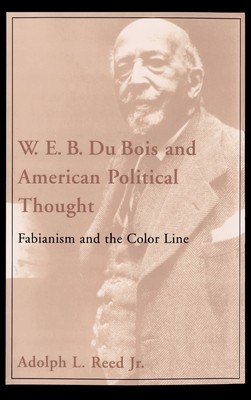
- We will send in 10–14 business days.
- Author: Adolph L Reed
- Publisher: Oxford University Press, USA
- ISBN-10: 0195051742
- ISBN-13: 9780195051742
- Format: 15.9 x 24.1 x 2.2 cm, hardcover
- Language: English
- SAVE -10% with code: EXTRA
Reviews
Description
In this pathbreaking book, Adolph Reed, Jr. covers for the first time the sweep and totality of W. E. B. Du Bois's political thought. Departing from existing scholarship, Reed locates the sources of Du Bois's thought in the cauldron of reform-minded intellectual life at the turn of the century, demonstrating that a commitment to liberal collectivism, an essentially Fabian socialism, remained pivotal in Du Bois's thought even as he embraced a range of political programs over time, including radical Marxism. Exploring the segregation-era political discourse which informed Du Bois's texts, and identifying the imperatives which triggered Du Bois's strategic political thinking, Reed reveals that Du Bois's core beliefs concerning such `ssues as the relationship between knowledge and progress, social stratification among blacks, and proper social organization, endured with little change from their early formulation in The Philadelphia Negro (1899). Reed's discussion, in addition to
demonstrating the theoretical rigor and integrity of Du Bois's work over nearly six decades, involves a suggestive remapping of the history of progressive thought in this span, bringing clearly into view previously unexamined continuities and tensions between fin de siecle and later twentieth-century socialist and Marxist discourses.
EXTRA 10 % discount with code: EXTRA
The promotion ends in 20d.05:58:06
The discount code is valid when purchasing from 10 €. Discounts do not stack.
- Author: Adolph L Reed
- Publisher: Oxford University Press, USA
- ISBN-10: 0195051742
- ISBN-13: 9780195051742
- Format: 15.9 x 24.1 x 2.2 cm, hardcover
- Language: English English
In this pathbreaking book, Adolph Reed, Jr. covers for the first time the sweep and totality of W. E. B. Du Bois's political thought. Departing from existing scholarship, Reed locates the sources of Du Bois's thought in the cauldron of reform-minded intellectual life at the turn of the century, demonstrating that a commitment to liberal collectivism, an essentially Fabian socialism, remained pivotal in Du Bois's thought even as he embraced a range of political programs over time, including radical Marxism. Exploring the segregation-era political discourse which informed Du Bois's texts, and identifying the imperatives which triggered Du Bois's strategic political thinking, Reed reveals that Du Bois's core beliefs concerning such `ssues as the relationship between knowledge and progress, social stratification among blacks, and proper social organization, endured with little change from their early formulation in The Philadelphia Negro (1899). Reed's discussion, in addition to
demonstrating the theoretical rigor and integrity of Du Bois's work over nearly six decades, involves a suggestive remapping of the history of progressive thought in this span, bringing clearly into view previously unexamined continuities and tensions between fin de siecle and later twentieth-century socialist and Marxist discourses.


Reviews